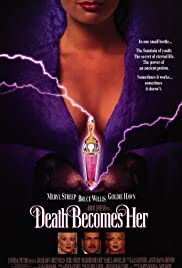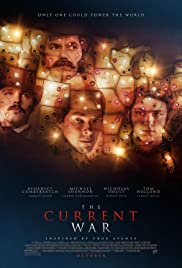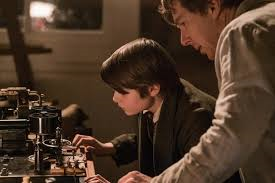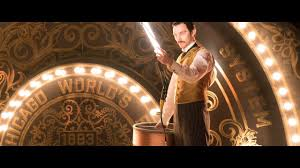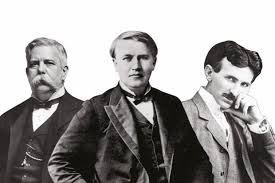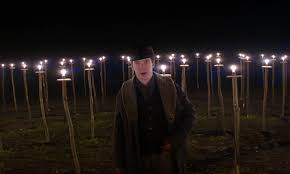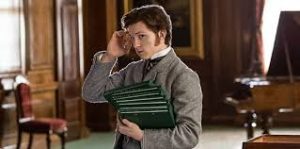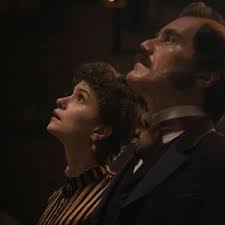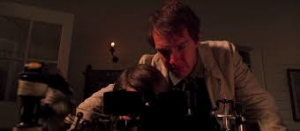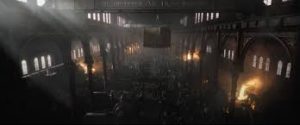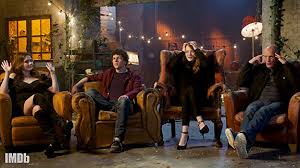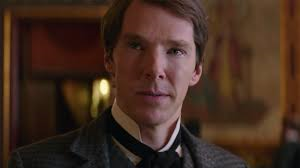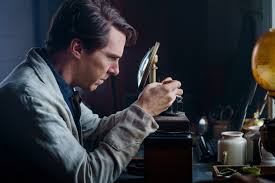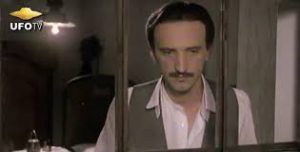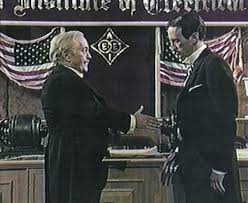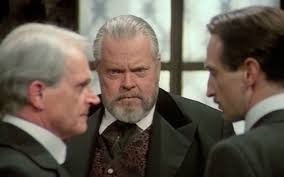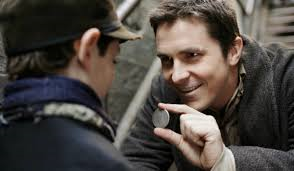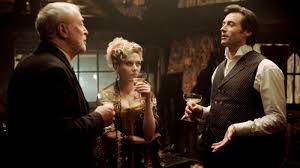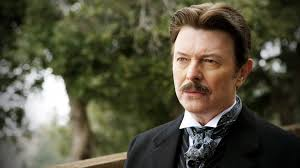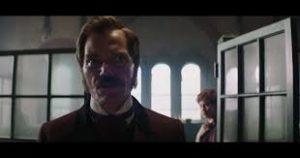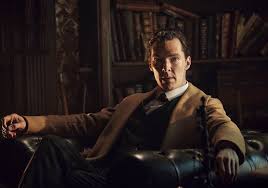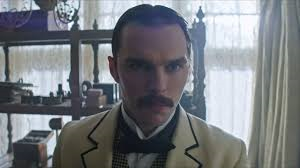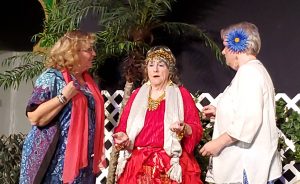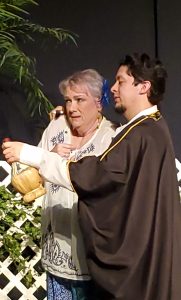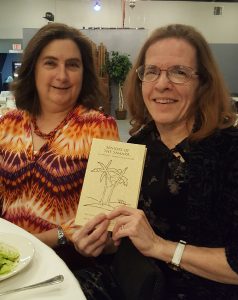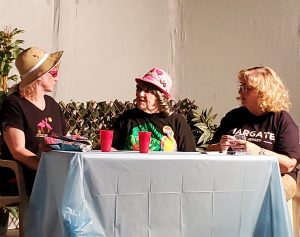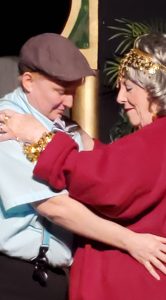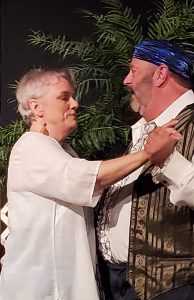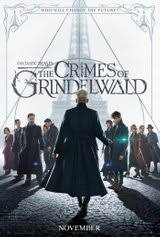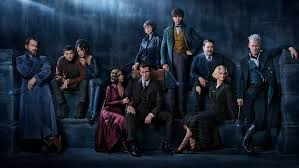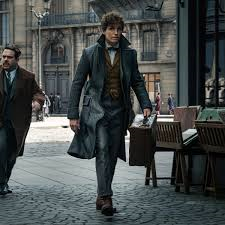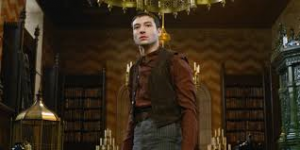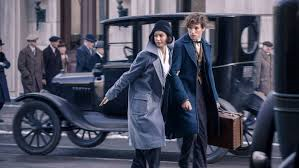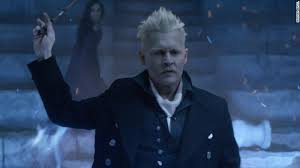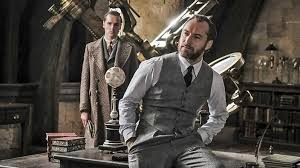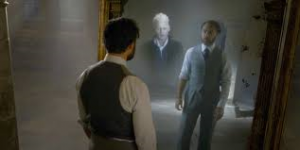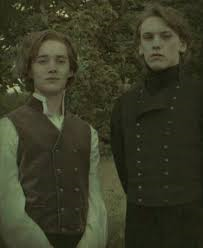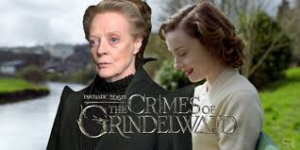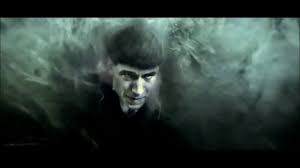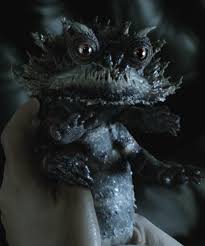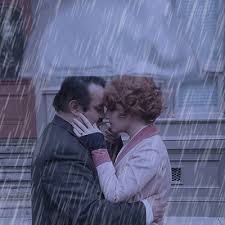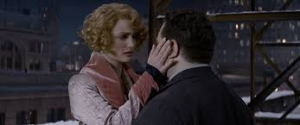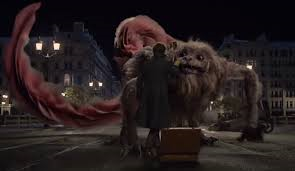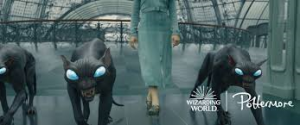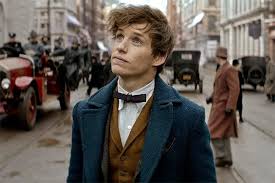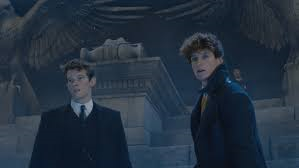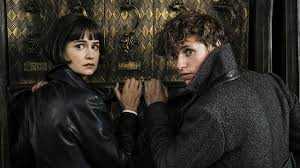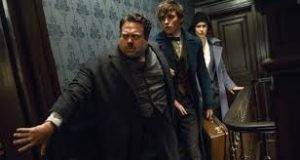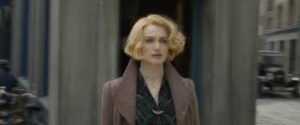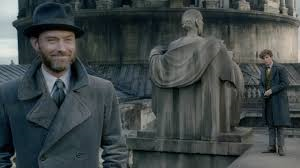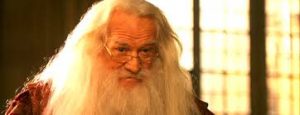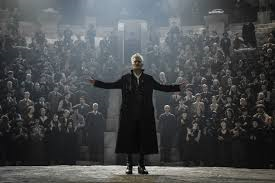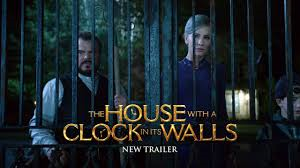
SHORT TAKE:
Mediocre fantasy, under utilizing what should have been a winning combination of Jack Black and Cate Blachett, with scenes which may just have some truly disturbing motivations behind them.
WHO SHOULD GO:
To be safe – adults only.
AND IF YOU LIKE THESE REVIEWS PLEASE SUBSCRIBE! THEN YOU'LL GET EVERY NEW REVIEW SENT STRAIGHT TO YOUR E-MAIL!!
GO TO THE BOTTOM OF THE LEFT HAND SIDE AND TYPE YOUR E-MAIL IN – IT (SHOULD BE) THAT EASY. ANY PROBLEMS PLEASE SEND ME A COMMENT AND I'LL DO MY BEST TO RESOLVE YOUR ISSUE.
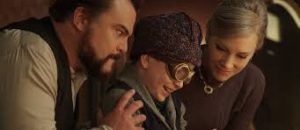
LONG TAKE:
The House with a Clock in its Walls made me sad, but not in the way that movies are supposed to make you sad, like in Titanic, or Old Yeller, or at the end of Funny Girl.
Maybe it was because it wasn't nearly as good as I thought it was going to be, or maybe it was something more sinister.
SPOILERS
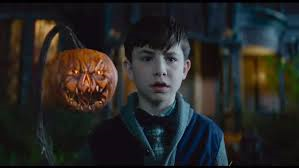
The premise is of an orphaned boy, Lewis, who is sent to live with his only remaining relative, a reclusive eccentric uncle,  Jonathan, (Jack Black), who, it turns out, is a warlock seeking a dangerous magical item, buried within the house, placed there by the house’s previous owner,
Jonathan, (Jack Black), who, it turns out, is a warlock seeking a dangerous magical item, buried within the house, placed there by the house’s previous owner,  Isaac, (Kyle MacLachlan). An interesting idea but not well carried out.
Isaac, (Kyle MacLachlan). An interesting idea but not well carried out.
First off, there is the acting. I have liked Jack Black ever since he started doing kid and youth films. He is a goofy pleasure in movies like 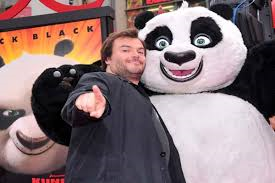 Kung Fu Panda,
Kung Fu Panda, 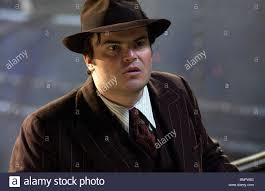 King Kong and
King Kong and  Goosebumps.
Goosebumps. 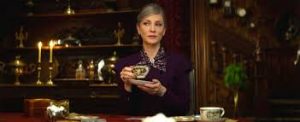 Cate Blanchett, who plays Jonathan's best friend and antagonist-neighbor Florence, brings an element of class to everything she's in, even the terrible
Cate Blanchett, who plays Jonathan's best friend and antagonist-neighbor Florence, brings an element of class to everything she's in, even the terrible 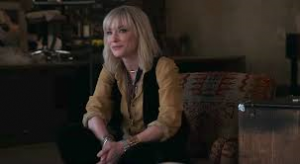 Oceans 8. And of course Blanchett was spectacular as
Oceans 8. And of course Blanchett was spectacular as 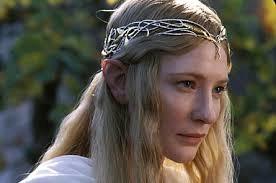 Galadriel in Lord of the Rings.
Galadriel in Lord of the Rings.
However the main character, 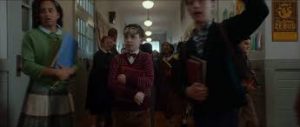 Lewis, (Owen Vaccaro) was just plain old not very good. Perhaps it was the directing but, for example, when the subject of Lewis' parents' death in a car crash comes up, he tears up and wails so much and unexpectedly, it is as though he is faking it and we're all left waiting for the other shoe to drop.
Lewis, (Owen Vaccaro) was just plain old not very good. Perhaps it was the directing but, for example, when the subject of Lewis' parents' death in a car crash comes up, he tears up and wails so much and unexpectedly, it is as though he is faking it and we're all left waiting for the other shoe to drop.
He is unconvincing in other key moments as well, such as when he is supposed to be desperate enough for a friend that he would break his uncle's one rule about not going near a cabinet which contains a forbidden book. There was no effort to convince the audience that Lewis would want to risk his new relationship with his magical uncle.
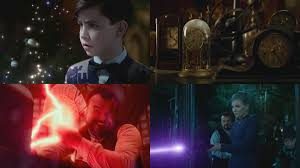 Maybe it was the inconsistent characters. Lewis comes to the attention of a school favorite named Tarby (Sunny Suljic), who genuinely seems to want to be kind to this new little outcast. But then, suddenly, Tarby is running for a school office, and after getting elected, Tarby becomes a bully. One of the other kids tells Lewis they are not surprised because Tarby does this every election season. This doesn't make any sense because there is very little Tarby has to gain from the friendship with Lewis.
Maybe it was the inconsistent characters. Lewis comes to the attention of a school favorite named Tarby (Sunny Suljic), who genuinely seems to want to be kind to this new little outcast. But then, suddenly, Tarby is running for a school office, and after getting elected, Tarby becomes a bully. One of the other kids tells Lewis they are not surprised because Tarby does this every election season. This doesn't make any sense because there is very little Tarby has to gain from the friendship with Lewis.
This turnabout is so awkward, sudden and confusing that I thought, surely, there was more to this character. Is he possessed by the evil ghost of Isaac? IS he the evil Isaac in disguise, and was just using Lewis to gain access to the house? This latter theory seemed to be further encouraged by Tarby's instant and pointed desire to open the one cabinet in the house Lewis’ Uncle Jonathan told him he must never go near, as though Tarby knew all along the forbidden book was there. But no, Tarby is just a mean kid who likes to be nice randomly but only for a few days and serves as a convenient shoe-horned plot device. Sorry, but that's just bad writing.
Then there is Jonathan’s back story.  Jonathan left home because he wished to pursue magic and simply assumed his little sister, Lewis' mother, did not want anything to do with him. So much so that Jonathan did not even go to her funeral. Yet without question Jonathan accepts that his sister would have sent her only child to live with him. These two points are inconsistent. Jonathan never has a real moment or explanation as to why he would be so deeply alienated with his sister.
Jonathan left home because he wished to pursue magic and simply assumed his little sister, Lewis' mother, did not want anything to do with him. So much so that Jonathan did not even go to her funeral. Yet without question Jonathan accepts that his sister would have sent her only child to live with him. These two points are inconsistent. Jonathan never has a real moment or explanation as to why he would be so deeply alienated with his sister. 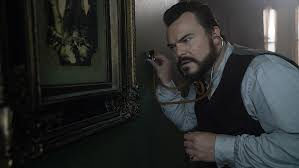 And no explanation as to why he would, without question, believe his sister would leave her only child in his care. Which is it? Did Jonathan believe his sister hated him or not?
And no explanation as to why he would, without question, believe his sister would leave her only child in his care. Which is it? Did Jonathan believe his sister hated him or not?
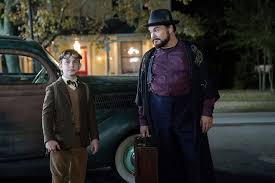 The movie has so many misdirections, without purpose, that I got the feeling it was written backwards, with the ending in sight but little attention to making sure the path to it from the introduction made sense. And whenever the writer had to get from point A to Point B he just sewed on a patch to make the two plot points connect.
The movie has so many misdirections, without purpose, that I got the feeling it was written backwards, with the ending in sight but little attention to making sure the path to it from the introduction made sense. And whenever the writer had to get from point A to Point B he just sewed on a patch to make the two plot points connect.
AND – OH YEAH – the clock turns out to be "under the boiler". I'm sorry, but in what universe does "under the boiler" put it therefore "— in the Walls"?
Also, I’m not sure what demographic audience they were going for. 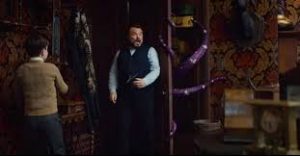 It’s silly enough that it should attract a young child crowd – fart jokes and Addams Family-like purple monster snake-tarantulas, standing up to bullies in middle school and ooh aah moments of solar systems coming to life in the living room.
It’s silly enough that it should attract a young child crowd – fart jokes and Addams Family-like purple monster snake-tarantulas, standing up to bullies in middle school and ooh aah moments of solar systems coming to life in the living room.
But then there are extremely creepy scenes which would make the movie unacceptable for that same young group: poisoning evil anthropomorphized mannequins to death, violent repeated shaking preceding transformations much like the very disturbing way Penny-Wise the Clown shook in the modern It, a dead mother, 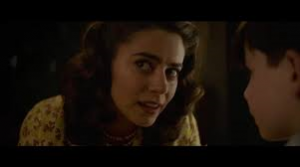 (portrayed by Lorenza Izzo, now the estranged wife of the director Eli Roth) appearing in her son’s dreams to get him to seek out a forbidden book, necromancy, having truck with a forked tongued demon who actually licks blood off one of the character’s hands – basically a 7th book Harry Potter aimed at first Harry Potter book-aged children.
(portrayed by Lorenza Izzo, now the estranged wife of the director Eli Roth) appearing in her son’s dreams to get him to seek out a forbidden book, necromancy, having truck with a forked tongued demon who actually licks blood off one of the character’s hands – basically a 7th book Harry Potter aimed at first Harry Potter book-aged children.
Then there is the more sinister aspect of the flaws.
There is an expression I learned in business: The Appearance of Impropriety. That is when, even if your motives are pure as a newborn baptized baby, there are just some things you should avoid doing. For example, whenever my husband drove our babysitters home, he would always tell our kids, "Come on! Let's all go for a ride!" and away a pack of them would go to keep the baby sitter company on the ride. He and I rightly believe that an adult male alone in a car with a young person not his own child is just not appropriate.
And, we do not much care for casinos in our community, so we boycott them. When a close friend held his daughter's wedding reception at one of the casinos’ restaurants, it was with great regret that we had to decline to attend the party. Had we gone, it would have seemed as though we were endorsing the casino. In both cases, we were avoiding The Appearance of Impropriety.
In The House, I am not saying that the character of Uncle Jonathan is doing anything wrong.  He keeps his distance, had not sought out the child but was assigned the responsibility of raising his dead sister's son. But the writers left certain bread crumbs that perhaps it would have been better in the current environment not to have sown.
He keeps his distance, had not sought out the child but was assigned the responsibility of raising his dead sister's son. But the writers left certain bread crumbs that perhaps it would have been better in the current environment not to have sown.
For example, near the end Jonathan is youthened to a baby but left with an adult head. This puts Lewis in a position of carrying around a naked adult in miniature. After Jonathan is restored, while hiding behind some equipment, he asks Lewis to throw him his pants, but more damningly, asks Lewis not to tell anyone that he, Jonathan, was left naked.
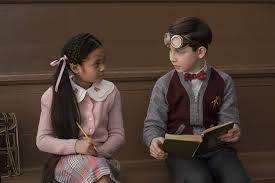 Given the circumstances, this is awkward at best. In the current climate of heightened awareness of an epidemic of underage inappropriate sexual predation by authority figures, this was, even in the best light, ill thought out and in very poor taste. Much like the scene in the dog movie Show Dogs, where an animal was coerced into allowing inappropriate touching for judging purposes, even if the circumstances made the behavior objectively understandable, this is not something you want to use as an example for children to follow. Moreover, as book stories are fantasy and so can be written any way the film makers want, there was ZERO reason to put in scenes where Lewis is carrying around a naked man OR to be sworn to secrecy by that same adult male concerning his nakedness in front of the child.
Given the circumstances, this is awkward at best. In the current climate of heightened awareness of an epidemic of underage inappropriate sexual predation by authority figures, this was, even in the best light, ill thought out and in very poor taste. Much like the scene in the dog movie Show Dogs, where an animal was coerced into allowing inappropriate touching for judging purposes, even if the circumstances made the behavior objectively understandable, this is not something you want to use as an example for children to follow. Moreover, as book stories are fantasy and so can be written any way the film makers want, there was ZERO reason to put in scenes where Lewis is carrying around a naked man OR to be sworn to secrecy by that same adult male concerning his nakedness in front of the child.
Even assigning innocent motives to the writers, these scenes smack of grooming for pedophiles and should be cut or re-written AS the makers of  Show Dogs said they would do. (Though I have not personally confirmed whether or not they actually HAVE re-edited Show Dogs to eliminate or change the offending genital-touching/judging scenes).
Show Dogs said they would do. (Though I have not personally confirmed whether or not they actually HAVE re-edited Show Dogs to eliminate or change the offending genital-touching/judging scenes).
Did the writer, Eric Kripke and director Eli Roth, deliberately set up scenes where a young boy is in a compromising situation with an adult male who swears him to secrecy in order to help desensitize millions of children to a similar real life scenario with far more corrupted, ugly and disgusting motives? Or was this just an ill-thought out, ignorant gag by Kripke and Roth, because neither, best I can find out, have any children so did not fully consider the implications?
I don’t really know. But, as I have inculcated to our own children a zillion times: I have never known anyone who regretted being too careful, but I have known a LOT of people who regretted not being careful enough.
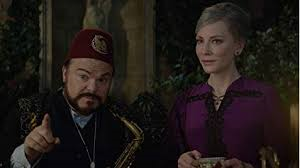 What makes me sad, though, is that a movie which could have and should have been a somewhat fluffy entertainment must be analyzed in this way. Fifty years ago we could have easily attributed the innocent motives of the film makers at face value and shrugged off the possibility of any nefarious underlying motives – ALTHOUGH perhaps fifty years ago pedophia grooming could have been perpetrated in this way and we just would not have known to watch for it because its prevalence was not what it is today.
What makes me sad, though, is that a movie which could have and should have been a somewhat fluffy entertainment must be analyzed in this way. Fifty years ago we could have easily attributed the innocent motives of the film makers at face value and shrugged off the possibility of any nefarious underlying motives – ALTHOUGH perhaps fifty years ago pedophia grooming could have been perpetrated in this way and we just would not have known to watch for it because its prevalence was not what it is today. 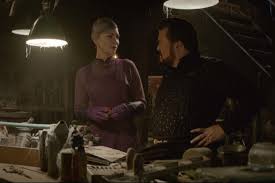 Either way, the fact we live in a culture wherein it becomes necessary that even light fare today MUST be scrutinized so carefully in order to protect children makes me very sad.
Either way, the fact we live in a culture wherein it becomes necessary that even light fare today MUST be scrutinized so carefully in order to protect children makes me very sad.
So – while it’s fairly brainless amusement for adults, it might just be "Stranger Danger" level inappropriate for the kids – whether the film makers intended it to be or not.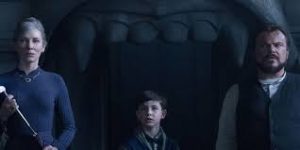
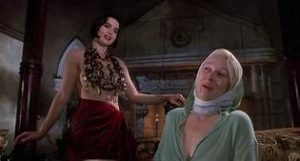 Not to mention the fact it is just plain old fun to watch.
Not to mention the fact it is just plain old fun to watch.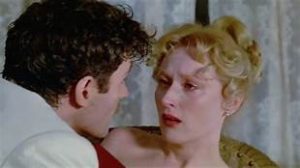 Sophie’s Choice,
Sophie’s Choice, 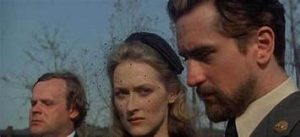 The Deer Hunter and
The Deer Hunter and 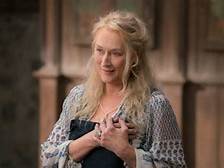 Mama Mia.
Mama Mia. Laugh-In in her youth, is better known for breathy brainless characters in light frothy comedies like
Laugh-In in her youth, is better known for breathy brainless characters in light frothy comedies like 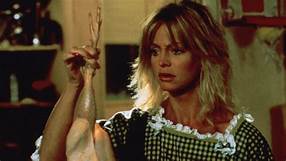 Overboard,
Overboard, 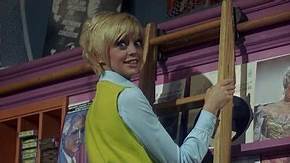 Cactus Flower and
Cactus Flower and  The Out of Towners.
The Out of Towners.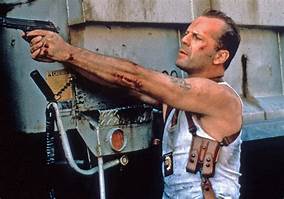 Willis is usually synonymous with John McClaine’s Yippie-ky-yo-kay-yay smart aleck action heroes in heart pounders like
Willis is usually synonymous with John McClaine’s Yippie-ky-yo-kay-yay smart aleck action heroes in heart pounders like  Die Hard or
Die Hard or  Red or
Red or  The Expendables or
The Expendables or  The Whole Nine Yards.
The Whole Nine Yards.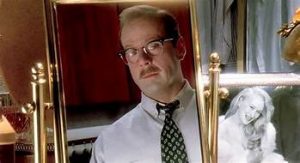 Ernest Menville. Meryl Streep is
Ernest Menville. Meryl Streep is  Madeleine Ashton, a character which would have appalled even her steely Miranda Priestly from
Madeleine Ashton, a character which would have appalled even her steely Miranda Priestly from  The Devil Wore Prada. Goldie Hawn is Madeleine’s opponent, Helen Sharp,
The Devil Wore Prada. Goldie Hawn is Madeleine’s opponent, Helen Sharp, 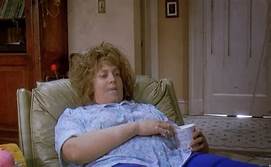 who goes through
who goes through  two major transformations to appease her vengeful bitter personality.
two major transformations to appease her vengeful bitter personality. Isabella Rossellini, who looks more like her mother,
Isabella Rossellini, who looks more like her mother, 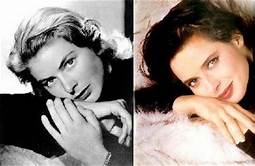 the cinema icon Ingrid Bergman, with each passing year.
the cinema icon Ingrid Bergman, with each passing year.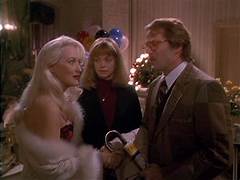 The story revolves around the aptly nicknamed “Mad” and “Hel” as they spend 20 odd years tussling over Willis’ character the way two dogs might play tug-o-war with a toy. Not because either really wants it but because they don’t want the other dog to have it. And the result is not all that good for the tug-o-war toy.
The story revolves around the aptly nicknamed “Mad” and “Hel” as they spend 20 odd years tussling over Willis’ character the way two dogs might play tug-o-war with a toy. Not because either really wants it but because they don’t want the other dog to have it. And the result is not all that good for the tug-o-war toy. 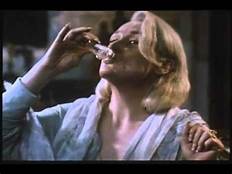 A sorceress’ magic potion, a castle full of dead celebrities (watch for cameos), and a few scenes of comically gory violence all make this appropriate for the Halloween season.
A sorceress’ magic potion, a castle full of dead celebrities (watch for cameos), and a few scenes of comically gory violence all make this appropriate for the Halloween season. The very dark humor which chides the shallow pursuit of youth at any cost, the excellent straight faced performances despite the bizarre goings on, and the surprisingly philosophical and moral message structuring the backbone of Willis’ character arc makes this a movie well worth your time.
The very dark humor which chides the shallow pursuit of youth at any cost, the excellent straight faced performances despite the bizarre goings on, and the surprisingly philosophical and moral message structuring the backbone of Willis’ character arc makes this a movie well worth your time.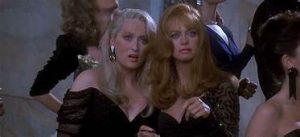 The clever script was written by Martin Donovan, whose resume is cluttered with 1970’s TV shows, and David Koepp, whose pedigree includes both Jurassic Park and the movie version of Mission: Impossible. Directed by Robert Zemekis whose genius guided Who Framed Roger Rabbit, Back to the Future and Forrest Gump, this is one of those rare movies which will make you laugh and think at the same time, pondering the nature of what makes life worth living.
The clever script was written by Martin Donovan, whose resume is cluttered with 1970’s TV shows, and David Koepp, whose pedigree includes both Jurassic Park and the movie version of Mission: Impossible. Directed by Robert Zemekis whose genius guided Who Framed Roger Rabbit, Back to the Future and Forrest Gump, this is one of those rare movies which will make you laugh and think at the same time, pondering the nature of what makes life worth living.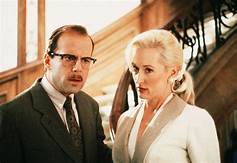 So for this year’s All Hallows’ Eve film, instead of the mindless cotton candy of a slasher movie, I recommend Death Becomes Her for a multi-course cinematic meal, which will supply the table with: a healthy portion of thrills, a fairly large helping of gore, a generous splash of magic, some well tossed laughs, and finally a satisfying aperitif of well served justice.
So for this year’s All Hallows’ Eve film, instead of the mindless cotton candy of a slasher movie, I recommend Death Becomes Her for a multi-course cinematic meal, which will supply the table with: a healthy portion of thrills, a fairly large helping of gore, a generous splash of magic, some well tossed laughs, and finally a satisfying aperitif of well served justice.